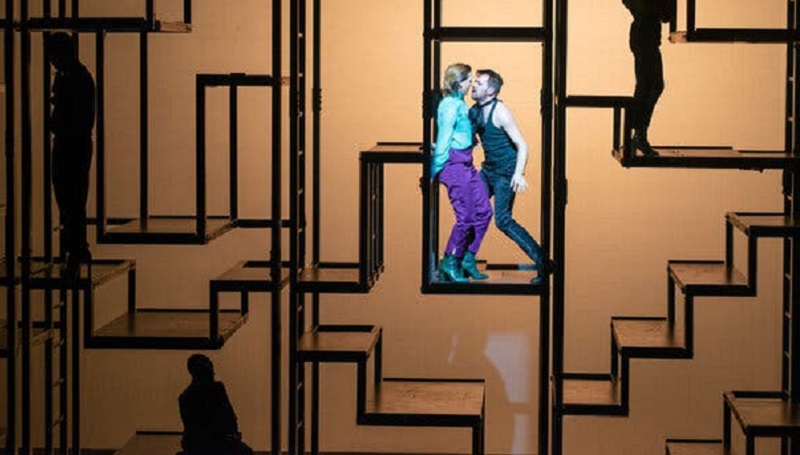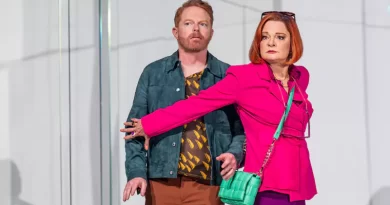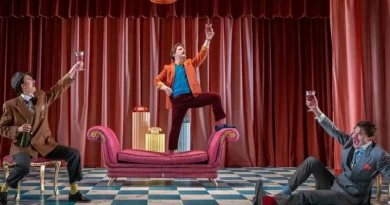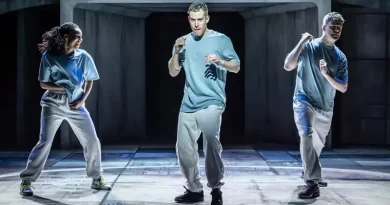“The Threepenny Opera”, Berliner Ensemble
Hans-Jürgen Bartsch in Berlin
15 August 2021
The Berliner Ensemble started the new [post-2021 lockdown] season with a revival of Die Dreigroschenoper (The Threepenny Opera), Bertolt Brecht’s free adaptation of John Gay’s burlesque The Beggar’s Opera, with music by Kurt Weill. This theatre has been associated with that play since 1928 when it was premiered on this very stage (then called the Theater am Schiffbauerdamm). It was an immediate success, and within two years entered the repertoire of 120 German theatres.

Nico Holonics (foreground) and ensemble in The Threepenny Opera.
Photo credit: JR Berliner Ensemble.
A century later, it remains one of the most popular plays, not only on German stages. The current production is the Berliner Ensemble’s fifth revival of the classic. It was scheduled to open in January but due to successive lockdowns had to be postponed twice. It finally opened in August. Brecht is reported to have reproved the premiere in 1928 for being too wilfully entertaining and missing the intended social criticism. I imagine he would have been equally critical of this revival. Barrie Kosky, who directs it, is at the helm of the Komische Oper (one of Berlin’s three opera houses), and not surprisingly his mise-en-scène emphasizes the play’s operatic elements. The show is closer to Gay’s satirical burlesque (and the possibilities it offers to poke fun at opera and operetta) than to Brecht’s blend of comedy and social criticism.
Kosky’s emphasis is on light-hearted entertainment. Most of the subliminal social and political satire has gone missing. The production is a far cry from the conventional revivals which until recently were under the thumb of Brecht’s heirs and had to be endorsed by them. Already the first scene is an illustration of Kosky’s directing style. After the seven-member band – outstanding musicians playing fifteen different instruments under the baton of Adam Benzwi – has finished the “Mackie Messer” (“Mack the Knife”) ballad and the (very un-Brechtian) glittering curtain goes up, we expect an equally sumptuous set to come into view. But all we see, or rather don’t see, is a pitch-dark stage … until a spotlight picks out a face and a pair of dangling legs. When the stage lights are finally switched on we realize that the face and legs belong to Jonathan Peachum (Tilo Nest), the manager of “The Beggar’s Friend Ltd”, sitting on a scaffold-like metal construction that occupies the whole of the stage. He jumps down and, in the manner of an academic lecturer, explains how he “employs” beggars, assigns a London district to each of them, and lends them the outfits most likely to impress their “victims”. Sarcasm remains the defining feature throughout the evening.

The abstract set, which could also be described as a multi-storey climbing frame (designer: Rebecca Ringst), leaves it to the spectators to imagine the different locations where the action takes place: Peachum’s store, Jenny’s dive where the prostitutes go about their business, the barn where Macheath is secretly wed to Peachum’s daughter Polly, or the prison in which Macheath awaits his execution. Steep stairs lead to tread-size platforms from where the protagonists deliver most of their lines. The construction poses a formidable challenge to the actors: they need the skills of acrobats and mustn’t suffer from vertigo. Not all of them manage as well as Nico Holonics’ Macheath, nicknamed “Mac the Knife”, the leader of a gang of London street bandits. He is constantly on the move, running up and down the stairs and jumping from one platform to another.
In an amusing scene which Kosky has added to the original, Macheath demonstrates disdain for the show by leaping down to the orchestra pit, snatching the score from the conductor, shouting “This is a three-penny opera!”, and inviting the audience to join him in chanting the well-known “Haifisch” (“shark”) ballad: “And the shark, he has teeth and he wears them in his face. And Macheath, he has a knife, but the knife one doesn’t see”. But in this revival the shark’s teeth look rather blunt. Although pretending to villainy, Holonics’ Macheath comes across as a nonchalant fellow who fancies himself as an irresistible womanizer. He marries Peachum’s daughter Polly (engagingly portrayed by Cynthia Micas as a sensible, self-assured young woman) but at the same time woos Lucy, the daughter of the corrupt chief constable Brown (cross gender cast with Kathrin Wehlisch), who is his close pal. In contrast to Polly, Miss Lucy (Laura Balzer) is a tempestuous young woman who uses her excessively shrill voice to insult her adversary. Mack the Knife is unconcerned; he knows from experience that “love lasts, or it doesn’t”. No wonder Polly’s parents become his archenemies.

Two of the cast shine with unruffled performances that stand out from the turbulence around them. Both are also accomplished singers. Striding about in an elegant fur coat, Constanze Becker’s Celia, Peachum’s imperious wife and business partner, spares no effort and no trick to engineer Macheath’s downfall. She incites her husband to blackmail the chief constable with a threat to call out all the town’s prostitutes to disturb the forthcoming coronation ceremony, and she persuades Macheath’s erstwhile lover Jenny, the madam of a brothel, to help her track him down. Bettina Hoppe portrays the prostitute Jenny as a calm and reasonable woman who has learned to despise the petite bourgeoisie for their double moral standards and their belief that money can buy anything. Here we get – at last – a hint of Brecht’s socio-political subtext. A last-minute happy ending saves Macheath from dying on the gallows. He has the noose already tied around his neck when a herald announces the King’s decision to pardon him, and the fairytale opera ends joyfully with him repeatedly rejoicing “Gerettet!” (“Saved!”).









